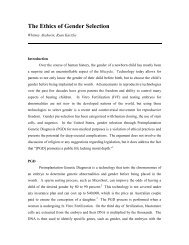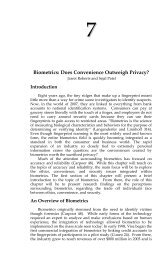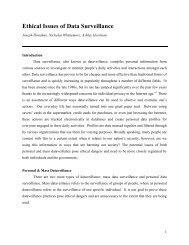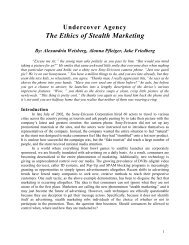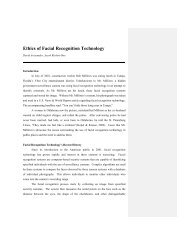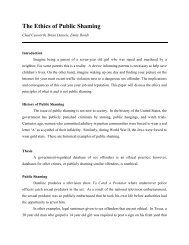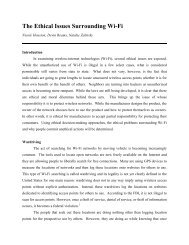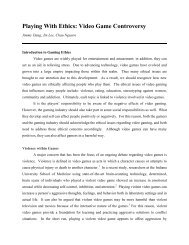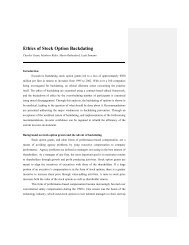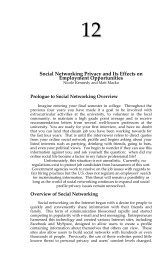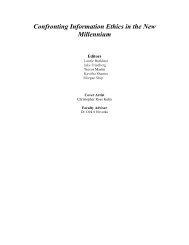Ethical Issues of Presenting Misinformation in Docudramas
Ethical Issues of Presenting Misinformation in Docudramas
Ethical Issues of Presenting Misinformation in Docudramas
You also want an ePaper? Increase the reach of your titles
YUMPU automatically turns print PDFs into web optimized ePapers that Google loves.
<strong>Ethical</strong> <strong>Issues</strong> <strong>of</strong> <strong>Present<strong>in</strong>g</strong> <strong>Mis<strong>in</strong>formation</strong> <strong>in</strong><br />
<strong>Docudramas</strong><br />
CT Charlton, Dan Kronisch, Kyle Stewart, Ryan Wilt<br />
_____________________________________________________________<br />
Introduction<br />
The problem <strong>of</strong> whether or not it is ethical to present false <strong>in</strong>formation <strong>in</strong> a factual<br />
film <strong>in</strong> order to produce a dramatic effect or arouse debate is the ma<strong>in</strong> question at hand <strong>in</strong><br />
this paper. In a genre, such as documentaries, where the facts are the most important part<br />
<strong>of</strong> the film, it is necessary for film makers to present only accurate <strong>in</strong>formation <strong>in</strong> their<br />
quest to produce a compell<strong>in</strong>g documentary. Us<strong>in</strong>g outright lies to sway the op<strong>in</strong>ion <strong>of</strong><br />
the viewers is unpr<strong>of</strong>essional and unethical. <strong>Docudramas</strong> (which are def<strong>in</strong>ed as a type <strong>of</strong><br />
television m<strong>in</strong>iseries or movie that uses a sequence <strong>of</strong> events from a real historical<br />
occurrence to create a film-script <strong>in</strong>tended to provoke debate about an event or<br />
occurrence (Docudrama and Mock-Documentary, 2002)) have been used irresponsibly <strong>in</strong><br />
the effort to raise concern about historical events. In these films, directors tend to distort<br />
many facts and occasionally <strong>in</strong>ject events that never actually occurred to promote debate.<br />
This practice is unethical and the follow<strong>in</strong>g discussion will exam<strong>in</strong>e the implications and<br />
possible solutions to this ethical problem.<br />
Background<br />
The docudrama is a blend <strong>of</strong> two very different genres: documentaries, which are<br />
presentations or re-creations <strong>of</strong> both fact and history to show the unbiased truth, and<br />
melodramas, which create situations that are <strong>in</strong>tended to stun and surprise audiences. In<br />
this blend, docudramas do not hold explicitly to the structures <strong>of</strong> either genre. They<br />
present facts and, at the same time, tell a story that keeps the audience guess<strong>in</strong>g on an<br />
eventual conclusion that is likely already public knowledge. In order to keep people<br />
<strong>in</strong>terested <strong>in</strong> the facts that they likely already know, it is necessary for the director to<br />
emphasize the facts that support the side <strong>of</strong> the issue that they wish to highlight.
<strong>Docudramas</strong> have been <strong>in</strong> existence <strong>in</strong> some form or another for as long as people<br />
have shared their stories with one another. The desire to use actual historical <strong>in</strong>formation<br />
when tell<strong>in</strong>g a story <strong>in</strong> a more dramatic fashion is someth<strong>in</strong>g that has been seen s<strong>in</strong>ce the<br />
earliest days <strong>of</strong> film. The idea <strong>of</strong> a docudrama is to <strong>in</strong>corporate historical fact with<br />
literary and narrative techniques <strong>in</strong> order to create a story-like depiction <strong>of</strong> an actual<br />
event. While docudramas have existed for years, they have only recently become the<br />
topics <strong>of</strong> ethical debates with a special emphasis on how facts can be stretched <strong>in</strong> order to<br />
create a more dramatic effect. A recent example <strong>of</strong> this was seen <strong>in</strong> the September 2006<br />
ABC m<strong>in</strong>iseries entitled The Path to 9/11. This film was marketed <strong>in</strong> the US, as well as<br />
<strong>in</strong> other countries, as the “<strong>of</strong>ficial true story” <strong>of</strong> the events that lead to the World Trade<br />
Center attacks <strong>in</strong> September <strong>of</strong> 2001. The film‟s producers orig<strong>in</strong>ally claimed that the<br />
entire film was based on the 9/11 Commission Report, a statement that was later<br />
modified to say that it was only partly and loosely based on the actual report. What is<br />
be<strong>in</strong>g emphasized by this example is not whether it was right or wrong to <strong>in</strong>ject <strong>in</strong>stances<br />
<strong>of</strong> fiction <strong>in</strong>to the script, but rather that it <strong>in</strong>cluded these pieces <strong>of</strong> mis<strong>in</strong>formation while<br />
orig<strong>in</strong>ally claim<strong>in</strong>g to only present true facts.<br />
<strong>Docudramas</strong> are <strong>of</strong>ten <strong>of</strong> a political nature when ethical questions arise regard<strong>in</strong>g<br />
the validity <strong>of</strong> specific facts. The Path to 9/11, The Reagans, and even the 2006 film<br />
United 93 were politically motivated films that have received criticism for how their<br />
respective stories are portrayed. Due to the nature <strong>of</strong> politics and the controversy that<br />
commonly accompanies it, it is not overly surpris<strong>in</strong>g that films <strong>of</strong> this nature create such<br />
debate.<br />
When produc<strong>in</strong>g a docudrama, it is necessary that the construction <strong>of</strong> the film is<br />
such that it not only provides the facts that are important to the issue but also create a<br />
story that will keep the audience‟s attention and ease their understand<strong>in</strong>g <strong>of</strong> the issue.<br />
Creative license is seen <strong>in</strong> almost every ma<strong>in</strong>stream film and can now be seen <strong>in</strong><br />
docudramas as well. This, comb<strong>in</strong>ed with a goal to persuade the viewer to one specific<br />
position <strong>of</strong> an issue, has given docudramas a reputation for be<strong>in</strong>g a bias form <strong>of</strong><br />
journalism.<br />
The Problem
In order to be considered a factual and ethical docudrama, there are certa<strong>in</strong><br />
standards that should be met. The first is that the evidence portrayed <strong>in</strong> these films<br />
should be factual and not distorted <strong>in</strong> any way via other media sources. In a British<br />
docudrama about a drug connection between Colombia and the UK called The<br />
Connection, images were shown <strong>of</strong> mules pass<strong>in</strong>g <strong>in</strong>to Brita<strong>in</strong> with hero<strong>in</strong> concealed <strong>in</strong><br />
their stomachs. It was later found that no such th<strong>in</strong>g happened and that it was only a<br />
fabrication created by the director. Examples like this one lead to the creation <strong>of</strong><br />
unethical dramas ma<strong>in</strong>ly because the audience is expect<strong>in</strong>g truth and is presented with<br />
lies, lead<strong>in</strong>g to both the destruction <strong>of</strong> the validity <strong>of</strong> docudramas as well as a greater<br />
distrust between audiences and filmmakers. The director <strong>of</strong> a docudrama should have the<br />
obligation to portray the truth as it actually occurred, not simply what they wish to show<br />
<strong>in</strong> order to create a more dramatic effect. It is imperative that when present<strong>in</strong>g the facts<br />
<strong>of</strong> a given issue, the director abides by the ethical rules <strong>of</strong> docudramas and documentaries<br />
and does not add <strong>in</strong>consistent or <strong>in</strong>correct facts. This would be similar to present<strong>in</strong>g<br />
mis<strong>in</strong>formation to voters <strong>in</strong> political campaigns or present<strong>in</strong>g false <strong>in</strong>formation on a<br />
resume.<br />
<strong>Docudramas</strong> vs. Documentaries<br />
Similar problems can be seen <strong>in</strong> documentaries where cases <strong>of</strong> mis<strong>in</strong>formation or<br />
<strong>in</strong>tentionally <strong>in</strong>accurate <strong>in</strong>formation are presented <strong>in</strong> order to make the film more one-<br />
sided, possibly without the audience even notic<strong>in</strong>g. If documentary filmmakers are go<strong>in</strong>g<br />
to freely express their op<strong>in</strong>ion through film, they cannot legitimately call their films<br />
documentaries. Instead <strong>of</strong> look<strong>in</strong>g at the makers <strong>of</strong> documentaries as filmmakers, it is<br />
better to view them as journalists represent<strong>in</strong>g facts. In the world <strong>of</strong> journalism,<br />
journalists are not free to depict events however they would like; they have a<br />
responsibility to their audience, their subjects, and their peers to present evidence <strong>in</strong> the<br />
most unbiased and accurate way possible.<br />
<strong>Docudramas</strong> and documentaries are thus similar because the makers <strong>of</strong> each type<br />
<strong>of</strong> film have an ethical obligation to present the facts as they actually occurred. If either<br />
type <strong>of</strong> filmmaker attempts to present certa<strong>in</strong> fictional scenes, untrue facts, or even<br />
overly-dramatized films <strong>in</strong> general, they can simply be considered purveyors <strong>of</strong> fiction or
even blatant liars; the audience is dependent on them to present true <strong>in</strong>formation, and a<br />
breach <strong>of</strong> this expectation results when the filmmaker lies to the audience. By us<strong>in</strong>g<br />
these unethical practices, filmmakers <strong>of</strong> both docudramas and documentaries cheat their<br />
respective audiences and the other filmmakers with<strong>in</strong> their pr<strong>of</strong>ession by tak<strong>in</strong>g away<br />
from the validity <strong>of</strong> other such films. People will question not only the validity <strong>of</strong> specific<br />
films, but the validity <strong>of</strong> an entire genre (documentary and/or docudrama) as well.<br />
Implications<br />
One ethical implication that is obvious is the presentation <strong>of</strong> mis<strong>in</strong>formation.<br />
When false statements are made <strong>in</strong> a docudrama regard<strong>in</strong>g a specific person, it can be<br />
extremely difficult for those statements to be disproved. Even if degrad<strong>in</strong>g statements are<br />
true, the dilemma is whether or not there is a moral responsibility to protect another‟s<br />
private affairs (Rosenthal 233). A similar situation exists with the previously mentioned<br />
ABC docudrama The Path To 9/11. The series implies that President Bill Cl<strong>in</strong>ton<br />
ignored advice to pursue Osama B<strong>in</strong> Laden because he was too busy deal<strong>in</strong>g with the<br />
Monica Lew<strong>in</strong>sky scandal (Peyser 2). Essentially, Cl<strong>in</strong>ton is blamed for the tragic events<br />
<strong>of</strong> 9/11. The validity <strong>of</strong> this allegation is under review but no matter the result it will<br />
tarnish President Cl<strong>in</strong>ton‟s legacy. The aforementioned example <strong>of</strong> the ramifications <strong>of</strong><br />
someth<strong>in</strong>g as seem<strong>in</strong>gly <strong>in</strong>consequential as a TV show proves just how valuable<br />
pr<strong>in</strong>ciples <strong>of</strong> privacy and honesty can be.<br />
Even when a docudrama exhibits no mis<strong>in</strong>formation or mislead<strong>in</strong>g assumptions,<br />
there may still be ethical repercussions. Many docudramas are accounts <strong>of</strong> horrific<br />
events <strong>in</strong> history. Some people argue that the victims <strong>of</strong> these terrible events should have<br />
the right to keep them private. Of course there are also those who would argue that such<br />
limitations would violate the First Amendment right to the freedom <strong>of</strong> speech. After all,<br />
if the consent <strong>of</strong> every m<strong>in</strong>or subject had to be granted, it would be the end <strong>of</strong> media as it<br />
is known. An <strong>in</strong>terest<strong>in</strong>g example <strong>of</strong> this ethical dilemma dates back to the 1920s with<br />
what may be considered one <strong>of</strong> the greatest films ever made, E<strong>in</strong>ste<strong>in</strong>‟s Battleship<br />
Potemk<strong>in</strong>. After the film was released, a sailor who claimed to have survived a gruesome<br />
battle depicted <strong>in</strong> the film demanded payment for the rights to „his story‟. As it turned<br />
out, there was <strong>in</strong>sufficient evidence <strong>of</strong> the man‟s tale and no payments were made
(Rosenthal 120). This demonstrates that even the most seem<strong>in</strong>gly clear-cut ethical<br />
dilemmas can be difficult to resolve.<br />
<strong>Docudramas</strong> frequently tiptoe along the edge <strong>of</strong> both ethical and legal<br />
ramifications. These film producers dodge prosecution <strong>in</strong> a variety <strong>of</strong> ways, the first <strong>of</strong><br />
which is by add<strong>in</strong>g a disclaimer to the film. For example, the beg<strong>in</strong>n<strong>in</strong>g <strong>of</strong> a docudrama<br />
may read “The follow<strong>in</strong>g dramatization is based on police reports, personal <strong>in</strong>terviews,<br />
various news reports and court records. Some dramatic license has been taken <strong>in</strong> the<br />
creation <strong>of</strong> certa<strong>in</strong> scenes” (Carveth 4). It is true, but hard to believe, that a law exists for<br />
the sole purpose <strong>of</strong> protect<strong>in</strong>g the <strong>in</strong>accuracy <strong>of</strong> these features. The legislation, called the<br />
False Light Doctr<strong>in</strong>e, states that a person‟s privacy may be <strong>in</strong>vaded if the story is<br />
fictionalized or the use <strong>of</strong> their same name is un<strong>in</strong>tentional. Lawsuits have been filed<br />
claim<strong>in</strong>g that these „co<strong>in</strong>cidentally similar‟ stories are wildly <strong>in</strong>accurate, however the<br />
Supreme Court has ruled that actual malice must be proven for the pla<strong>in</strong>tiff to receive<br />
damages (Carveth 5). These precautions may protect aga<strong>in</strong>st litigation, but they don‟t<br />
change the plethora <strong>of</strong> ethical concerns exhibited by docudramas.<br />
Counter-argument<br />
One <strong>of</strong> the ma<strong>in</strong> counter-arguments to this problem is that directors <strong>of</strong> film have<br />
the right to use creative license to portray the issue as they see fit. This can be seen <strong>in</strong> all<br />
forms <strong>of</strong> media that are based on true stories.<br />
Creative license is an important tool for directors and producers <strong>of</strong> movies, TV<br />
shows, and radio broadcasts. It allows directors to take the facts <strong>of</strong> the event and produce<br />
a f<strong>in</strong>al product that is enterta<strong>in</strong><strong>in</strong>g, be<strong>in</strong>g a product <strong>of</strong> the enterta<strong>in</strong>ment bus<strong>in</strong>ess, as well<br />
as factual. Make no mistake, docudramas are produced to get rat<strong>in</strong>gs first and provide an<br />
accurate picture to the public second. This type <strong>of</strong> pseudo-journalism can be irresponsible<br />
because it does not force the creators to provide the facts <strong>in</strong> a straight forward manner.<br />
Michael Moore has, on more than one occasion, used the facts he has gathered to produce<br />
docudramas with glar<strong>in</strong>g bias and liberal views. This does not mean that the <strong>in</strong>formation<br />
he has provided was false but his agenda was not to simply present the facts, it was to<br />
persuade the viewer to accept his conclusion from the facts. All <strong>of</strong> Moore‟s docudramas
have been developed for exactly this purpose; he wants to sell an idea to the public. This<br />
k<strong>in</strong>d <strong>of</strong> film is why docudramas are under scrut<strong>in</strong>y.<br />
Suggestions<br />
Dur<strong>in</strong>g an era where documentary and docudrama films have become very<br />
popular, it is becom<strong>in</strong>g more and more important to ensure the validity <strong>of</strong> such films.<br />
The very def<strong>in</strong>ition <strong>of</strong> a docudrama states that it should be “factually accurate and conta<strong>in</strong><br />
no fictional elements.” Why then have there been portrayals <strong>of</strong> events <strong>in</strong> recent<br />
docudramas that never actually happened? The example <strong>of</strong> The Path to 9/11 m<strong>in</strong>iseries,<br />
which claimed to portray the tragic events lead<strong>in</strong>g to the September 11 th attacks on our<br />
country exactly as they actually occurred, is a perfect example <strong>of</strong> someth<strong>in</strong>g that should<br />
not have been able to happen: the market<strong>in</strong>g <strong>of</strong> a docudrama as accurate when the<br />
creators knew it wasn‟t.<br />
So why are these th<strong>in</strong>gs able to happen? One <strong>of</strong> the ma<strong>in</strong> reasons, mostly<br />
perta<strong>in</strong><strong>in</strong>g to documentary filmmak<strong>in</strong>g but relevant to docudramas, has to do with the<br />
consent forms that the “actors” are required to fill out. Most consent forms are written<br />
us<strong>in</strong>g such complicated language and legalese that they are virtually impossible to<br />
understand for the general populace. Therefore people tend to sign without<br />
understand<strong>in</strong>g the full implications <strong>of</strong> what they have signed. If many <strong>of</strong> these people<br />
actually read and understood what they were sign<strong>in</strong>g, they would likely see that “they are<br />
very nearly sign<strong>in</strong>g their lives away” (Cross-Cultural Filmmak<strong>in</strong>g p.52). With<strong>in</strong> many <strong>of</strong><br />
these consent forms lie certa<strong>in</strong> language that give the filmmaker the ability to portray the<br />
footage that they have collected <strong>in</strong> whatever manner they want to, even if the end result<br />
misconstrues whatever the actor (or <strong>in</strong> a documentary the participant) is attempt<strong>in</strong>g to<br />
convey. This participant signed their name on the dotted l<strong>in</strong>e so anyth<strong>in</strong>g the filmmaker<br />
does is technically legal, but at what po<strong>in</strong>t are they act<strong>in</strong>g unethical?<br />
The ethical questions that arise are closely related to a rights-based ethical<br />
framework. The viewers <strong>of</strong> a given film have the right to be presented with an actual<br />
assessment <strong>of</strong> factual <strong>in</strong>formation; after all, this is the primary reason for view<strong>in</strong>g such a<br />
film. The filmmaker doesn‟t have the right to use the film as a soapbox for their personal<br />
agenda, simply because they are <strong>in</strong> control <strong>of</strong> the subject matter.
An <strong>in</strong>itial suggestion to alleviate this problem, even if slightly, would be to allow<br />
the actors, or participants, <strong>in</strong> such films to sign the consent form after they have seen the<br />
f<strong>in</strong>ished product. If they decide they don‟t like what they see, and do not sign, then the<br />
film can not be released. This would help to prevent filmmakers from some <strong>in</strong>stances <strong>of</strong><br />
slander; if they make a film that they know the participants wouldn‟t be likely to sign <strong>of</strong>f<br />
on after see<strong>in</strong>g, the filmmakers would not waste their time and money creat<strong>in</strong>g a film that<br />
will never see the light <strong>of</strong> day. If a participant <strong>in</strong> a film is be<strong>in</strong>g paid for their<br />
appearance, they may sign any document, regardless <strong>of</strong> the slander that it may provoke,<br />
due to the economic <strong>in</strong>itiative. In this case, hav<strong>in</strong>g them sign before or after the<br />
completion <strong>of</strong> the film may not make much <strong>of</strong> a difference. Unfortunately, there isn‟t<br />
much that can be done about these cases. Obviously allow<strong>in</strong>g the participants to sign the<br />
consent form post-production and after they have screened the film would prevent some<br />
<strong>in</strong>stances <strong>of</strong> misconstructions <strong>of</strong> truth <strong>in</strong> these types <strong>of</strong> filmmak<strong>in</strong>g.<br />
A second suggestion to help solve the problem <strong>of</strong> mis<strong>in</strong>formation <strong>in</strong> docudramas<br />
would be to make it mandatory to clearly label all reconstructions. This is another step<br />
that only fixes the problem <strong>in</strong> small steps, but it would help nonetheless. Reconstructions<br />
and re-enactments are <strong>of</strong>ten clearly labeled as such <strong>in</strong> docudramas, television shows, and<br />
even <strong>in</strong>fomercials. But there are also <strong>in</strong>stances, especially <strong>in</strong> docudrama films, where<br />
reconstructions are attempt<strong>in</strong>g to pass <strong>of</strong>f as the actual events themselves. These would<br />
be the <strong>in</strong>stances where clear label<strong>in</strong>g should be mandatory. This would be a difficult<br />
practice to police, but some effort needs to be made to do so. The ma<strong>in</strong> problems with<br />
more factual docudramas are the reconstructed scenes that are attempt<strong>in</strong>g to convey an<br />
actual past event. Even if the re-enacted scene is for example 99.9% accurate, there is<br />
still a chance that that rema<strong>in</strong><strong>in</strong>g one tenth <strong>of</strong> a percent can misconstrue the entire truth,<br />
and therefore the scene should be labeled clearly as a re-enactment. An argument aga<strong>in</strong>st<br />
this measure would be the that even a scene that isn‟t a reconstruction, but a wholly<br />
accurate portrayal <strong>of</strong> an actual event, can still be potentially misconstrued or<br />
mis<strong>in</strong>terpreted by the viewer. The op<strong>in</strong>ion that one forms after hav<strong>in</strong>g seen a docudrama,<br />
documentary, or a film <strong>of</strong> any type for that matter, is completely personal. The least that<br />
a filmmaker can do to try and convey a historically and factually accurate depiction <strong>of</strong><br />
events is to clearly label any <strong>in</strong>stance that isn‟t actual live event.
One last suggestion is to create a secondary or subcategory <strong>of</strong> documentary or<br />
docudrama. This subcategory would <strong>in</strong>clude films such as those made by, for example,<br />
Michael Moore. Michael Moore is openly known as an extremely liberal activist, and his<br />
films tend to portray this fact. Although he is openly liberal and aga<strong>in</strong>st many <strong>of</strong> the<br />
policies that the current conservative adm<strong>in</strong>istration stands for, he is also known as a<br />
diligent fact-checker <strong>of</strong> the <strong>in</strong>formation he presents <strong>in</strong> his films. A film such as<br />
Fahrenheit 9/11 should be presented to the public <strong>in</strong> a subcategory <strong>of</strong> films that cannot be<br />
labeled as either docudrama or documentary. Although it is still a form <strong>of</strong> documentary<br />
film, we are suggest<strong>in</strong>g that it is presented with such blatant bias that it deserves its own<br />
category. This category should <strong>in</strong>clude films that present factual <strong>in</strong>formation, but are<br />
more biased and op<strong>in</strong>ionated than other documentaries. An entirely separate issue would<br />
be how to classify films…<br />
Conclusion<br />
Not to be lost <strong>in</strong> the read<strong>in</strong>g this paper is that a morally just and historically<br />
accurate documentary or docudrama can be an extremely valuable tool <strong>in</strong> learn<strong>in</strong>g about<br />
past events. Most docudramas pa<strong>in</strong>t a clear picture <strong>of</strong> relative facts, and may therefore be<br />
considered as helpful, ethical, and just. However, there are <strong>in</strong>stances <strong>of</strong> mis<strong>in</strong>formation<br />
<strong>in</strong> a small handful <strong>of</strong> these films and m<strong>in</strong>iseries, and it creates ethical dilemmas for the<br />
entire genre. This misrepresentation <strong>of</strong> <strong>in</strong>formation is irresponsible and unethical and<br />
directors, producers and actions should be more conscious and responsible for the content<br />
they choose to put <strong>in</strong> their films.
Works Cited<br />
Blumenthal, Max. “ABC 9/11 Docudrama‟s Right-W<strong>in</strong>g Roots.” The Nation 11 Sept.<br />
2006 .<br />
Carveth, Rod. “Amy Fisher and the ethics <strong>of</strong> „headl<strong>in</strong>e‟ docudramas”. Journal <strong>of</strong><br />
Popular Film and Television, 1993<br />
.<br />
“CBS Pulls Reagan M<strong>in</strong>iseries.” CNN 5 Nov. 2003<br />
.<br />
Lipk<strong>in</strong>, Steven N. “Real Emotional Logic: Persuasive Strategies <strong>in</strong> Docudrama.”<br />
C<strong>in</strong>ema Journal Summer 1999.<br />
McEnteer, James. Shoot<strong>in</strong>g The Truth. Westport: Praeger, 2006.<br />
Paget, Derek, Steven N. Lipk<strong>in</strong>, and Jane Roscoe. “Docudrama and Mock-<br />
Documentary: Def<strong>in</strong><strong>in</strong>g Terms, Propos<strong>in</strong>g Canons.” Docufictions. Jefferson,<br />
NC: McFarland and Company, Inc, 2006<br />
Peyser, Marc. “An Untrue Path?” Newsweek 8 Sept. 2006.<br />
The Regents <strong>of</strong> The University <strong>of</strong> California. Cross-Cultural Filmmak<strong>in</strong>g: A handbook<br />
for mak<strong>in</strong>g documentary and ethnographic films and videos. London, England:<br />
University <strong>of</strong> California Press, 1997.<br />
Rosenthal, Alan. Why Docudrama? Fact – Fiction on Film and TV. Edwardsville,<br />
Ill<strong>in</strong>ois: Southern University Press, 1999.<br />
W<strong>in</strong>ston, Brian. Lies, Damn Lies and Documentaries. London: British Film Institute,<br />
2000.



![Download Entire Book [PDF] - Ethicapublishing.com](https://img.yumpu.com/19531485/1/190x245/download-entire-book-pdf-ethicapublishingcom.jpg?quality=85)
![Download Entire Book [PDF] - Ethicapublishing.com](https://img.yumpu.com/19531484/1/190x245/download-entire-book-pdf-ethicapublishingcom.jpg?quality=85)
